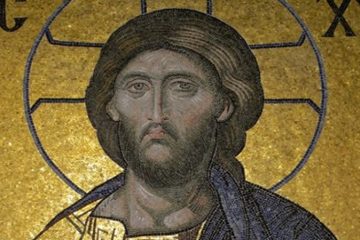Saint John Chrysostom
We shall now say something about the present feast. Many people celebrate feast days and know what they’re called, but don’t know why they were established. So everyone knows that the feast today is called Theophany, but don’t know what Theophany is, and whether it is one thing or another. And this is shameful- celebrating an annual feast day and not knowing the reason for its existence.
First of all, therefore, it’s necessary to say that there’s not one Theophany, but two: the actual one, which has already occurred; and the second, in the future, which will happen with glory at the end of the world. You’ll hear about both today from Paul, who, in his letter to Titus, speaks thus about today’s feast: “The grace of God has revealed itself, having saved all mankind, decreeing that we reject iniquity and worldly desires, and dwell in the present age in prudence and in righteousness and piety”; and about the future one: “awaiting the blessed hope and glorious appearance of our great God and Saviour Jesus Christ” (Tit. 2, 11-13).
Meanwhile, a prophet had this to say about this second of the two: “the sun will turn to darkness, and the moon to blood at first, before the great and illuminating Day of the Lord comes” (Joel 2, 31). Why isn’t the day on which the Lord was born considered Theophany, but rather this day, on which He was baptized? It was on this very day that He was baptized and sanctified the nature of water. Because on this day everyone takes some of the water and carries it home and keeps it all year. Because today the waters are sanctified. And an obvious phenomenon occurs: this water which was drawn today, in its essence doesn’t spoil with the passage of time, but, for a whole year and often for two or three, remains as unaltered and fresh as that newly drawn from a spring.
So why is this day called Theophany? Because Christ made Himself known not when He was born, but when He was baptized. Until that time people knew little of Him. This is clear from what John the Baptist has to say on the matter: “Among you stands He, Whom you do not know” (Jn.1, 26). And it is hardly surprising that others didn’t know Him, when even the Baptist wasn’t aware of Him until that day: “I myself didn’t know Him, but He who sent me to baptize with water said to me, ‘He on whom you see the Spirit descend and remain, this is He who baptizes with the Holy Spirit’” (Jn. 1, 33).
Thus it is evident that there are two Theophanies. But we also need to explain why Christ comes to be baptized and what kind of baptism it is, so I have to speak to you about both the one and the other, for through the one we shall learn about the other. There was the Jewish baptism, which cleansed bodily impurities, but didn’t remove sins. Thus, if somebody committed adultery, or was bent on stealing, or performed some other kind of misdeed, this baptism didn’t free them from guilt. But if they touched the bones of the dead, tasted food forbidden by the law, were contaminated through contact with certain other people, or consorted with lepers, then they washed, were impure until the evening, but then were cleansed.
“Let people wash their body in pure water”, it says in the Scriptures, “and they will be unclean until evening, and then they will be clean” (Lev. 15,5; 22, 4). These were not really sins or impurities, but since the Jews lacked perfection, God made them more observant by such means, and, from the first moment prepared them for an understanding of more important things.
So, Jewish cleansing did not free from sins, but only from bodily impurities. This is not so with ours: it is far more sublime and it manifests a great grace, by which it sets us free from sin, cleanses the spirit and bestows the gifts of the Spirit. The baptism of John, too, was far more sublime than the ordinary Jewish one, but still less so than ours; it was like a bridge between both baptisms, leading across from the former to the latter. For this reason, John didn’t give guidance for observing bodily purifications, but exhorted and advised that, as well as performing these, people should be converted from vice to good deeds and should trust in the hope of salvation and the accomplishment of good deeds, rather than in different washings and purifications by water.
John didn’t say: “Wash your clothes, wash your body, and you’ll be pure”, but “Bear fruits worthy of repentance” (Mt, 3, 8). Since it was more than that of the Jews, but less than ours, the baptism of John didn’t impart the Holy Spirit and didn’t grant forgiveness by grace. It gave the commandment to repent, but was powerless to remit sins. Which is why John also said: “I baptize you with water…He, however, will baptize you with the Holy Spirit and with fire” (Mt. 3, 11). Obviously, then, he didn’t baptize with the Spirit. But what does this mean: “with the Holy Spirit and with fire?”.
Recall the day on which, for the Apostles, “tongues as of fire appeared to them, distributed among them, and rested on each one of them” (Acts 2, 3). That the baptism of John didn’t impart the Spirit and remission of sins is evident from the following: Paul “found certain disciples, and said to them, ‘Did you receive the Holy Spirit when you believed?’. And they said, ‘No, we have not even heard that there is a Holy Spirit’. And he said, ‘Into what then were you baptized?’. They said, ‘Into John’s baptism’. And Paul said, ‘John baptized with the baptism of repentance, telling the people to believe in the one who was to come after him, that is, Jesus’.
On hearing this, they were baptized in the name of the Lord Jesus. And when Paul had laid his hands on them, the Holy Spirit came on them” (Acts 19, 1-6). Do you see how incomplete the baptism of John was? Had it not been incomplete, Paul wouldn’t have baptized them again, and placed his hands on them. After he had performed the second baptism he demonstrated the superiority of the apostolic Baptism and that the baptism of John was far inferior to it. From this, then, we recognize the difference between the baptisms.
Now it’s necessary to say why Christ was baptized and into which baptism? Neither the former, the Jewish, nor the latter, ours. Why would He have needed remission of sins, how is this possible, when He has no sin? “He committed no sin, neither was deceit found in his mouth.” (1 Pet. 2, 22); and further, “who among you convicts me of sin?” (Jn. 8, 46). And His flesh was not deprived of the Holy Spirit; how could it be when it was fashioned by the Holy Spirit in the first place? And so, if His flesh was not deprived of the Holy Spirit, and He was not subject to sin, then why was He baptized? But first of all it’s necessary to recognize by which baptism He was baptized, and then it will become clear.
(to be continued)
Source: pemptousia.com




0 Comments